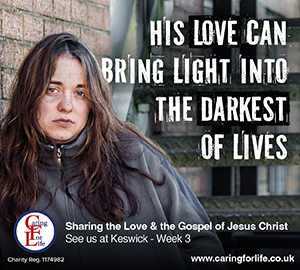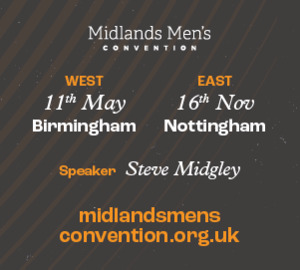Seven ways to spot a ‘BWW’ and why it matters
I’ll never be one of the ‘Blokes Worth Watching’ (BWW) nor will many of my friends that don’t fit.
Nay Dawson

I love leadership and evangelism. I want to invest precious years into mission and the future of the church, so I’m wondering how do I become one of the BWWs [as described in this article in last month's EN] ? How do I get mentored? How do I get invested in so that I can make a significant difference? The problem is, I can’t. I’m a woman. I’ll never be a ‘Bloke Worth Watching’ and neither will half of those made in the image of God.
The discussions on Twitter suggested that this was a historic and specific issue. That this was about men and favouritism. But as I read, I wondered to myself if anyone else had seen the other sizeable flaw. The one that struggles with the emphasis of the B in the BWW. The one that impacts half of those made in the image of God. The one that I noticed because I’m a woman.
In this article I want to show you how to spot a BWW and then explain why it matters.
How to spot a BWW
1. They get special treatment.
Sam, a leader I knew, was taken to a rugby match to persuade him to take a new ministry job. I asked why. The answer: ‘He could really be something’. Why was the woman at the same level not given the same treatment? No answer. He was and is a BWW.
2. They get mentored.
Pete, a friend in a local church, recently joined the latest preachers’ club. It’s all male, all under 30. These are our up-and-coming preachers. I get that. But what about the women teaching in Sunday school, home group, or in a parachurch setting? Have we thought about mentoring, training and equipping them? Are they not worth investing in? He was and is a BWW.
3. They get promoted.
Martin, in his early 20s, spoke at a series of evangelistic talks. No-one his age had spoken before. Others questioned and felt it was unfair, so I asked why. The response was ‘he is exceptional’. Doors opened for him and he’s not looked back. Some might say: ‘What’s wrong with choosing your best?’ Part of the problem with this is that we get blinded by institutional elitism. We prioritise certain people and certain backgrounds. We limit and control who is useful for building the church. He was and is a BWW.
4. They’re headhunted.
Nathan, halfway through his interview for a new job, was told: ‘It’s not if you get the job, it’s where’. The other interviewer wasn’t consulted. This candidate was headhunted. The outcome decided beforehand and the interview, well, just a façade. HR practices are often ignored, belittled, or fudged. Headhunting is essential to help the Old Boys’ Network flourish. Often others will bend and flex the rules to bring the right person in. Those that are most sought after are the BWW and yet again the cycle perpetuates. He was and is a BWW.
5. Their network is male.
The BWW ethos is all about men watching men watching men. A clue that you are one is that you don’t learn from women. You don’t have women investing in your life or central to the direction of your mission. When you ignore the potential of women, you buy into the belief that its only ‘blokes’ that are worth watching. I once asked a leader if I could join his organisation. He said that they ‘had a married woman work for them once but that didn’t work out well’. It’s not one, there are many similar organisations with all-male senior staff teams. Have a look at those in your network. Are they all men? Are they all from a similar background, or does it reflect the image of God that we see in Genesis 1:28? These are our BWW.
6. Their character flaws are ignored.
BWW have character flaws. Yet somehow, they’re often overlooked because what they do is so important. I’ve heard this said more than once:
‘But he’s so good at what he does.’
‘The mission wouldn’t survive without him.’
‘We know he has some problems, but we need him.’
BWW seem to have a special anointing that means character is glossed over and ministry continues. These are our BWW.
7. They are white.
After talking with a friend, they commented that there should be a W(hite) in front of the BWW. I asked them to give me an example of this and this is what I received. ‘A group of black young leaders attended a national Christian leaders’ conference. They looked forward to a time away of training and fellowship. It wasn’t overt, but the stares and looks of confusion at their presence were enough. Enough to indicate that they ought not have expected the warmest welcome. Finally, someone spoke out: ‘Are you sure you’re in the right place?’ One of the young people amongst the group sharing the experience years later said: ‘It was a horrible few days. I wouldn’t go back. I’ve even told my black friends and family not to go.’ These black young people, willing and gifted as they were, simply were not BWW. In fact, they may just be the furthest thing from it.’ These are not our BWW.
Why does it matter that I know how to spot a BWW?
This discussion matters because the Bible commends breadth in the church. Galatians 3:28 says: ‘There is neither Jew nor Greek, slave nor free, male nor female, for you are all one in Christ Jesus’. Can you see the breadth that the Bible commends in how you disciple young leaders?
1. It matters because the system is flawed.
Many have agreed that BWW is a problem, it’s flawed and can lead to so much pain. Here are some reactions to Glen’s article:
‘There is so much in this article that we need to read and reflect on. It’s a matter of high priority. I have spent many years thinking about the issues Glen raises,s since I’ve spent almost my entire adult life in the scene he describes.’
‘I was totally signed up to this system for a while.’
‘Brilliant, insightful, awful, tragic. Reduced me to tears.’
The first step for all of us is to name it and recognise it. Where do you see yourself in these stories above? How have you been affected by the BWW ethos?
2. It matters because men that don’t fit the mould matter.
Do you believe that you don’t matter to God? Do you believe your background prohibits you from serving in church?
If you don’t fit the mould, hear this; you matter to Jesus, you’re essential for the future of the church. Jesus does not have favourites, He has faithful followers. Jesus’ disciples did not fit any mould or type. Many of them were uneducated, blue-collar workers from a lower social background. Jesus chose a bunch of fishermen to be His disciples. He called women labelled as sinners and outcasts. He uses rough-and-ready Peter, the one who denied and disowned Him to be the rock on which the early church was built. Jesus had space for people who were taught well, but not in a systemised way; for example Timothy, taught by his Mum and Granny. The Bible is clear about this; James 2:9 calls out favouritism as sin.
Sadly, many others feel like this too; here are a few comments:
‘I grew up as a Christian in a BWW culture. The feeling of being unseen and “unbelonging” is so incredibly pervasive.’
‘Those excluded see most clearly, and feel most keenly, the privilege afforded to the few.’
‘It was at conferences where it was clear in conversations [that] I didn’t fit the model.’
The problem with this system isn’t just that people with potential get missed, but that we are investing in manifestly unsuitable people.
3. It matters because women matter.
Women are crucial and indispensable to redemptive history, including those thought worthless. I’m not suggesting a BWW scheme for women; I’m grateful the ‘birds worth watching’ has barely made it to the UK. But I am suggesting that women are seen as crucial and indispensable. That women are mentored, trained, and equipped. At pivotal moments in the life of Jesus it is women, rather than men, who are given insight. Women were taken under Jesus’ wing and were first told to proclaim to the world the good news. It was women who announced the birth of Jesus (Luke 1:20-56; while a man was silenced!). It was a woman to whom Jesus first disclosed His identity as the Messiah. It was a woman who was the first to proclaim the news to her community (John 4:25-30). And it was of course women who the apostles relied upon for the eyewitness testimony of Jesus’ death (Mark 15:40-41), burial (Mark 15:47) and the empty tomb (Mark 16). Do you value, mentor and include men and women as central to the mission of the church?
I’ll never be a ‘Bloke Worth Watching’, neither will half of those made in the image of God, nor many of my male friends that don’t fit. But after some consideration I’m not sure the BWW scheme is all it’s cracked up to be.
There are three different kinds of people reading this. Those that are part of the system and asking questions. Those that are part of the system and don’t know it, and those who are excluded from the system. Each of us will respond and react in different ways.
But let’s not write this off as someone else’s problem, or the fault of an unnamed college or a specific wing of the church. We all need to pause and look in the mirror ourselves. The problem is current and endemic for many of us. It’s in our culture; it’s our problem. We need to face the reality that we’re not just recipients of this problem, we’re part of the problem too.
We need to face up to the favouritism and elitism and choose to be different. Only then can we commit to repentance and change.
Nay Dawson is founder of Passion for Evangelism (a network of Female Evangelists) and Training Co-ordinator for the International Fellowship of Evangelical Students (IFES) Europe Regional Team.


